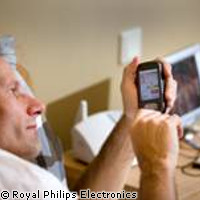Watch that heart
Clothes, bed sheets and home appliances could soon help heart patients to better deal with their condition. The new EU-funded HeartCycle project sets out to create innovative telemonitoring solutions. Launched on 1 March, it is one of the largest biomedical and healthcare research projects in the EU. The system that the industry-led research consortium is planning to develop will improve the quality of care for coronary heart disease and heart failure patients by monitoring their condition at home, using unobtrusive sensors built into everyday objects. At the same time, the system is intended to report automatically to clinicians, so that they can adapt therapies and make lifestyle recommendations, as well as involve the patients themselves in the management of their disease. The latter is a great challenge as well as a great opportunity, according to Professor John Cleland, head of the Department of Cardiology at the University of Hull, UK. 'Investing directly in people who need help, and not just in services that do things to or for them, makes sense in terms of improved care, greater affordability and the effective deployment of scarce nursing and medical resources,' he says. 'By developing systems that remotely monitor heart patients and motivate them to adhere to treatment regimes and adopt beneficial lifestyles, we hope to improve the survival of people with heart disease as well as contain the overall cost of care,' explains Henk van Houten, senior vice president of Phillips Research and head of the Healthcare Research programme. 'The development of such systems can only be achieved efficiently via multi-disciplinary partnerships between hardware engineers, software engineers, textile manufacturers, industrial designers, clinical experts and healthcare providers, as is the case in the HeartCycle project,' Mr van Houten adds. The public and private 18 project partners from Germany, Greece, Finland, Spain, Portugal, the Netherlands, the UK, Italy, Switzerland and China come from numerous different backgrounds in research, academia, medicine and industry. Over a period of four years, the EU will invest more than €14 million in the HeartCycle research under its Seventh Framework Programme (FP7). The total project cost amounts to nearly €22 million. HeartCycle builds on the progress made by the MyHeart project, which will end in December 2008 and received funding under the Information Society Technologies (IST) programme of the Sixth Framework Programme (FP6). MyHeart, bringing together some of the same actors, developed advanced telemonitoring technologies and service concepts to enable people to play an active role in maintaining their health. It was during this research that the project partners identified home-based disease management as a potential field for improving medical standards of care, an objective that HeartCycle is trying to achieve with a focus on coronary heart disease. A total of 1.9 million deaths in the EU every year are the result of cardiovascular diseases, causing annual health costs of €105 billion. Half of those deaths occur in people who have previously had a heart attack, which is why the project partners consider 'finding better ways to manage and treat coronary heart disease and chronic heart failure as one of the most effective ways of reducing the human cost and financial burden of these debilitating conditions.'



